

At first you might think you can work around a missing tooth, but the impact it has on your ability to eat, speak, and smile will only become more and more obvious over time. There are a few different options for restoring your missing tooth/teeth, but there’s only one that will replace the entire structure of a missing tooth roots and all: dental implants. Whether you’ve only lost one tooth or are missing an entire arch, we encourage you to schedule an appointment at Nelson Y. Howard, D.D.S. today to learn why dental implants in San Marcos might be your best option.


A dental implant is not actually a prosthetic tooth; rather, it is something that we can use to anchor a restoration to your jawbone. Most implants are made out of titanium, and they take the form of a screw-like post. When placed in your jaw, they can fuse with the bone through a process called osseointegration. This is how they replace the roots of your missing teeth, and what will give the replacement prosthetics their lifelike stability and comfort. Osseointegration takes several months, but the end result is a strong foundation for your new teeth that will provide greater chewing power and prevent slipping. The dental implant is topped with a custom-made crown, bridge, or denture depending on how many teeth you’re missing. Rebuilding your missing teeth from the roots up gives you a smile that looks, feels, and functions just like natural once again!

To get dental implants, a patient must go through a complex and multi-step process. This fact means an implant treatment will take several months. Even so, note that the prosthetic teeth are worth much time and effort. We at Dr. Howard’s dental office ensure quality work by placing implants in-house. Our entire dental team uses their training and skills to produce great results. In particular, you can expect four main steps from the treatment: consultation, surgery, osseointegration, and delivery of final restoration.

An implant treatment always starts with a consultation. This talk with Dr. Howard will cover what you want from dental implants. In addition, it’ll give us a chance to learn your oral health history, medical background, and more. Our office can then confirm whether implants truly suit your needs. If they do, we’ll quickly draft a custom treatment plan.
If you don’t qualify for dental implants at first, don’t worry. We’ll gladly help you get preliminary services – gum disease therapy, tooth extraction, etc. Once you’ve had these procedures, your mouth should be strong enough to handle implants.
Should we approve your surgery, the consultation will also review the details of your treatment. Such facts will include your treatment timeline, costs, and similar matters.

Our office places implants in-house, so we won’t refer you to other specialists. Your surgery should thus proceed quickly without the extra travel. Plus, Dr. Howard will have instant access to your dental records if you’re a returning patient.
The implant surgery itself will involve the following:

After the surgery, your new implant(s) will slowly fuse with your jaw. This process – also known as osseointegration – takes about 4-6 months. The implant post(s) should be permanent and secure once it’s done.
You’ll have another surgery after implant fusion. For this second one, we’ll set an abutment (i.e., a metal connector) over your implant. The new part will secure your final restoration. (The latter will be crafted from earlier dental impressions.)

You’ll get your final restoration at the end of the implant process. The specifics of this prosthetic will depend on how many teeth you’ve lost. Based on the final number, it could be a dental crown, a dental bridge, or a denture.
We won’t need long to fit your restoration. To be honest, adding it to your implant only requires some dental cement. We’ll then make a few last-minute changes. Should all go well, the visit will end with a gorgeous and fully restored grin!

So why choose dental implants over more traditional forms of tooth replacement? The short answer is that since they’re the only option for replacing the roots of the teeth, they carry all sorts of benefits that you would miss out on if you simply got a regular bridge or denture. We can go over some of these advantages during your implant consultation so that you have the full context to decide whether or not implants truly are your best option.

The most obvious benefits of dental implants are the ones you’ll notice every day when you’re eating you’re favorite meals, talking with your friends, and giving people you meet for the first time a brilliant smile.

In addition to the everyday benefits of dental implants, you’ll also find that having new teeth supported by artificial tooth roots offer a number of dental benefits as well.

As the years go by, the long-term advantages of dental implants will become more and more apparent.

Most people who have lost one or more teeth are candidates for dental implant placement. If you’re interested in the procedure, we’ll first need to make sure that you have stable oral health, decent overall health, and a jawbone with enough strength and density to support the new posts. There are some additional procedures that might be performed to prepare your mouth for surgery. Once everything is ready, we can use the following restorations to rebuild your smile from the roots up.

Not every patient is a good candidate for dental implants right off-the-bat, but Dr. Howard and our team can help get you there. During your initial consultation, we’ll take X-rays of your mouth and conduct a thorough examination of your teeth and gums to make sure that we have a healthy foundation to secure your dental implants to. We typically look for the following traits in good dental implant candidates:
Once you determine that you’d like to move forward with the treatment, we’ll create a customized treatment timeline that will explain how we plan to restore your smile with dental implants in San Marcos and walk you through it so you know exactly what to expect.

Whether a tooth has been knocked out or extracted, it’s important to replace it as soon as possible before neighboring teeth move into the gap. We can place a single dental implant into the empty space and attach a dental crown to it. This is a more conservative approach compared to a dental bridge that rests on nearby teeth.

When multiple teeth are lost, you don’t necessarily need an individual implant for each one. A couple of implants can be used as the base for a dental bridge or a partial denture. When these restorations are attached to implants, not only will they look more natural, but they’ll be more secure as well.

Normally, full dentures rest directly on your gums. As a result, they might not fit anymore once the shape of the gums changes due to bone loss. We can place four to eight dental implants in your upper or lower arch to hold your dentures in place. This greatly improves your bite strength, letting you enjoy a healthier, more varied diet than you would with traditional dentures.
Learn More About All-On-4 Dental Implants Learn More About Implant Dentures

Depending on the state of your oral health, you might want to think about getting mini dental implants. Since they’re smaller than regular implants, they require less jawbone density to be placed and supported. They can even usually be loaded with prosthetic teeth within a few hours, and your mouth will heal much faster after the procedure.

Your dental implant treatment will be completely personalized based on your health, the number of teeth you’ve lost, and your various other dental needs. That means the price of the dental implant procedure will be different for everyone. But don’t worry; we can give you an accurate idea of how much it will cost after a consultation, when we can take into account all the variables. You’re sure to find that having a full, strong smile is well worth the investment.

In many cases, preparatory procedures need to be done prior to the implant placement surgery. For instance, you may need to have a tooth removed, gum disease therapy performed, or a bone graft in order to qualify for dental implants. These procedures will add to the total cost of treatment. Then, the pricing also depends on how many posts you are receiving in the placement procedure itself. The good news is that Dr. Howard can perform most, if not all, of the work right here in our office, so you won’t receive bills from multiple practices.

Just like any other products in the market, such as cars or toasters, dental implants come in various brands and are made from different materials, each with their own advantages and pricing. When Dr. Howard meets with you to discuss your implant needs, he’ll select the brand that best meets those needs. In addition, the type of restoration, which is attached to the implants, will affect the cost. Obviously, the more teeth you need to replace, the more expensive the restoration will be.

When considering costs, remember that implants tend to last much longer than other forms of tooth replacement. As a result, you won’t have to pay to replace the restorations, helping you save money in the long run. You also need to consider all the priceless benefits that come with dental implants, such as a stronger bite, improved oral health, and more confidence to eat or talk in front of others. Needless to say, the upfront cost of dental implants typically turns out to be the smarter long-term investment.

It likely doesn’t. Most dental insurance plans do not include coverage for dental implants. However, most will partially cover the cost of preliminary procedures, like gum disease therapy, as well as the cost of the restoration. At your consultation, our team will see if we can find ways to use your benefits to your advantage and try to keep your out-of-pocket costs to a minimum.

If you find paying for dental implant treatment all at once overwhelming for your budget, we understand completely. Instead of having to come up with a one-lump sum, you can break the cost into easier monthly payments by financing the cost through CareCredit with a low-interest rate or even with no interest at all! We can guide you through the application process and answer any questions you may have.

Not everyone is a good candidate for dental implants right away. Sometimes, preliminary treatments are necessary to prepare your mouth for the procedure. This is because dental implants heavily rely on a strong jawbone and healthy surrounding tissue. Here are some advanced procedures that are often used to prepare patients for their new smile.
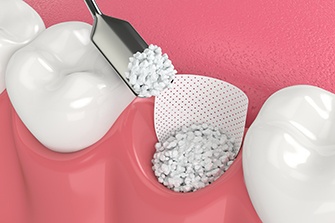
For your implants to be successful sufficient jawbone density is crucial. This is why your dentist may recommend that you have bone grafting before you move forward with the dental implant placement procedure. This is more common for those who have been missing teeth for a long period of time. Bone grafting works by transplanting bone minerals to the appropriate areas of the jawbone. The process relies on guided tissue regeneration. This usually takes several months to heal, but it makes a huge difference in the longevity of your dental implants.
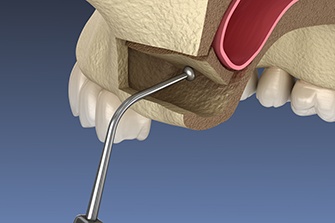
When dental implants are placed in the back of the mouth, it sometimes becomes necessary to also perform a sinus lift. This is because when you are missing teeth, it can create a significant gap. Without enough bone present to keep the implant in place, it could protrude into the sinus cavity and lead to complications. To keep this problem from occurring, the sinus can be conservatively lifted, and grafting material can be placed around the implant. This helps to cut down on recovery time, increasing the success rate.
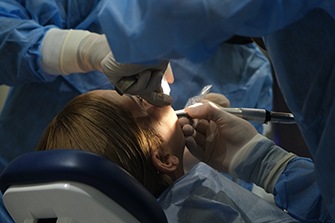
If your jawbone isn’t wide enough to support dental implants, we might need to perform a ridge expansion – sometimes called an alveolar ridge augmentation. First, the bone is divided. Then, the space can be filled with grafting material to widen the space and create a denser area. Once the area has healed, we can move on to place the dental implants. Then, you will be one step closer to a complete smile.

Even with a success rate of well over 95%, dental implants can still have a small chance of failing due to various factors. The good news is that our team can offer salvage treatment for patients who are experiencing issues with their new teeth. Not only can we save your dental implant, but we can also address the underlying problem surrounding your tooth root so that a problem is less likely to arise in the future.
Learn More About Dental Implant Failure & Salvage

Once you’ve undergone your dental implant procedure, you’ll need to ensure that your recovery goes swimmingly so that your results are successful. Fortunately, our team can provide you with specific guidelines on how you can do this while healing at home. Be sure to notify us if you have any questions or concerns during this time so that we can help maximize your recovery.

Keeping your surgical site will be extremely important when it comes to effective healing. The last thing you want is to disturb the blood clot forming around your dental implants, which can increase the risk of failure. After your surgery, you’ll want to get plenty of rest and implement the following measures:

While you shouldn’t feel any pain during your surgery, it’s normal to experience mild discomfort during your recovery. Here are some of the common symptoms you might notice during your healing phase and how to address them:

Since you’ll want to avoid chewing on the side of your mouth where your dental implant is, your diet should consist mainly of softer foods that won’t risk disturbing the surgical site. This means you should eat meals like:

After the first day following your procedure, you should resume cleaning your smile daily while being careful around the dental implant site. This means you should brush twice a day, floss at least once or after meals, and use mouthwash that doesn’t contain alcohol (which can irritate the surgical area). You might also rinse with salt water 2-3 times a day to keep bacteria at bay.

After you’ve properly recovered, you’ll return to our office to receive your restorations. Once your dental crown, bridge, or dentures have been placed, you might experience some sensitivity or discomfort, but this can easily be managed with painkillers and it’s short-lived. After ensuring your bite is correct and that you’re satisfied with the results, you’ll be good to enjoy your newly rebuilt smile. Reach out to us if you notice any issues like bleeding or swelling so that we can resolve the problem.

With the proper maintenance, your newly rebuilt smile can last for up to three decades, making your investment in dental implants a lifelong one. Below, we’ve outlined some basic regular care tips for your new restorations and implants. If at any point you have questions or concerns about the health of your implants, give our office a call.

Just like with your natural teeth, a good at-home oral hygiene routine is crucial to keep your dental implants and prosthetic in working order and healthy. As recommended by the American Dental Association and our team, brush your teeth twice daily for at least two minutes, being sure to use a soft-bristled toothbrush. We also recommend flossing at least once a day and rinsing with antimicrobial mouthwash.

What you eat can also impact the health of your dental implants. Regularly snacking on foods that are high in carbohydrates like sugars and starches can lead to an increase in harmful oral bacteria. As a result of this, infections could occur that compromise the stability of your implants. Try substituting fresh fruits and vegetables, and other nutrient-rich foods for snacks to bring balance to your diet and smile.

Bad oral habits like using tobacco products and biting your nails can affect your restored teeth as well as your natural ones. For the highest treatment success rate possible, we recommend stopping smoking no later than two weeks before your dental implant placement and over three weeks after. Smoking has been shown to increase the risk of implant failure. Other habits, like nail biting can also cause excess wear-and-tear on your prosthetic.
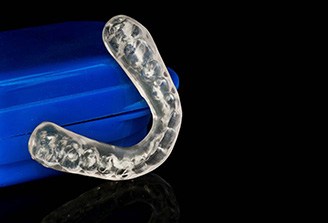
If you grind your teeth at night, be sure to invest in a customized nightguard to protect your implants and prosthetic from the additional strain and force this causes. Dr. Howard offers high-quality, durable nightguards that can reduce jaw pain and help you avoid excessive dental wear-and-tear.
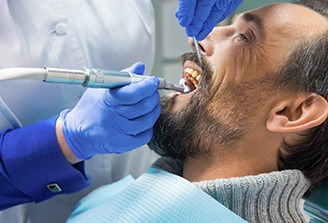
In addition to good at-home oral hygiene, it’s also important for you to schedule and attend bi-annual checkups and cleanings with your dentist in Rancho Bernardo. These visits will allow us to make sure your implants are healthy, and if we spot any issues, we’ll be able to address them before they have an opportunity to progress and permanently damage your new teeth.
Are you still curious about dental implants? You’re in the right place! Dr. Howard is a skilled implant dentist in San Marcos who wants his patients to have all the information they need before beginning treatment. If you have any specific concerns, please don’t hesitate to contact our office to speak with one of our friendly team members. Until then, we’ve included the answers to some of the most frequently asked questions about dental implants below.
Unlike other replacement options, dental implants are designed to last for decades with proper care. In fact, they can even last for the rest of your life! All you have to do is ensure that you’re practicing regular oral healthcare like brushing, flossing, and visiting our office. Your routine checkups and cleanings are incredibly important because they allow us to catch any problems while they’re still small, helping you enjoy your implants for years to come.
Many patients hear that implants require surgery and automatically question the safety of the procedure. However, this procedure is incredibly safe, comfortable, and predictable. Depending on your needs, we offer sedation and anesthesia to make your procedure comfortable and relaxing. In fact, you could look at dental implants as the safest replacement option because they come with a variety of health benefits. Primarily, they keep your jawbone strong, which prevents additional tooth loss and a sunken facial appearance. Plus, dental implants reduce risks of common dental issues like gum disease.
You can enjoy total peace of mind knowing that dental implants in San Marcos have a success rate of 95% even after 10 years! This reliability and predictability will give you the confidence you need to choose the best tooth replacement option available. Dr. Howard will always make sure that the placement and restoration of your implants go as smoothly and safely as possible. There is a slim chance of failure, but this is usually due to poor lifestyle choices like smoking or insufficient jawbone density for the placement of implants.
It’s never too late to regain your full, healthy, and beautiful smile! Once you’ve reached the age of an adult, your jawbone stops growing, which makes getting dental implants a possibility. That said, older patients will often have oral and overall health complications, which is why an initial consultation is vital. We will examine your mouth and discuss your needs before recommending any necessary preliminary treatments. This treatment plan may include services like bone grafting, tooth extractions, gum disease therapy, and more.
While dental implant failure is quite uncommon, it typically happens for one of two reasons: failed osseointegration and peri-implantitis. Failed osseointegration refers to when the titanium post of the implant does not properly fuse with the bone structure of the jaw, which deprives the restoration of the sturdy foundation it needs to function properly and last a long time. Peri-implantitis, on the other hand, refers to when gum disease compromises the soft tissues and bone structures supporting the implant, and it usually happens due to poor oral hygiene. Dental implants may also fail due to frequent teeth grinding, tobacco use, exposure of the head or neck to radiation, certain medications that interfere with the healing process such as blood thinners, and health conditions such as diabetes, hemophilia, osteoporosis, and cancer.
An implant that is about to fail may exhibit symptoms such as severe pain in the implant area as well as inflammation and swelling of the gums supporting it. The implant may feel loose, and you may develop changes in how your teeth come together when you bite down. These symptoms will only get worse without professional intervention, so contact our office in San Marcos as soon as possible if you discover any of them. We may be able to save loose dental implants regardless of when they were placed.
Most people will not have fully developed jaws until early adulthood, and placing dental implants too soon can interfere with bone development and lead to serious oral and overall health complications later. To prevent this, most dentists will not place dental implants in patients below the age of eighteen. If a patient loses a tooth in childhood or adolescence, we may be able to place an appropriate restoration to maintain the empty space on their dental arch so they can receive a dental implant when they are old enough. However, keep in mind that dental implants do not have any upper age limits.
Most people who receive dental implants will be able to resume their normal activities the day after their surgeries, but the whole recovery process will take several months to complete. During this time, the post of your implant will gradually fuse with your jawbone to create the strong foundation the restoration needs to exert maximum chewing power and last for as long as possible. Post-surgical bleeding and swelling should stop after several days, and it’s best to avoid intense exercise for about a week after you receive dental implants. If you experience discomfort, you can manage it with prescribed or over-the-counter pain medication, but contact our San Marcos office if you experience worsening pain or notice symptoms of infection like fever, fatigue, or a foul taste in your mouth.